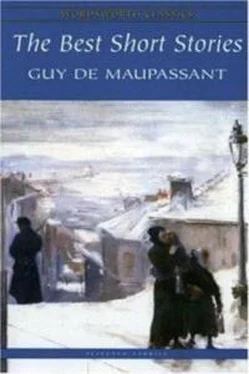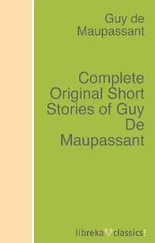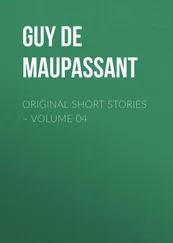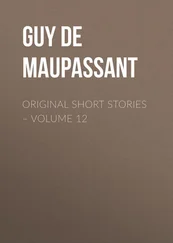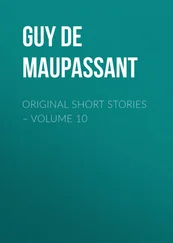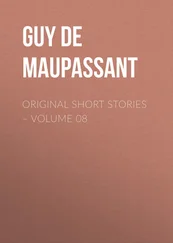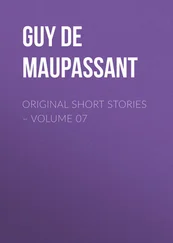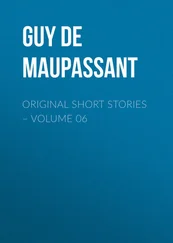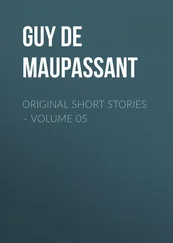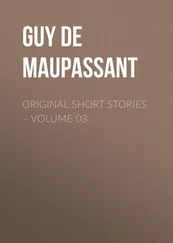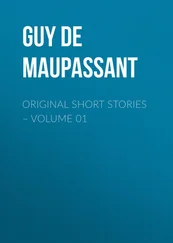M. Patissot returned home and carefully studied the map. He wished to try on his shoes, which were more like skates than shoes, owing to the spikes. He slipped and fell, promising himself to be more careful in the future. Then he spread out all his purchases on a chair and looked at them for a long time. He went to sleep with this thought: "Isn't it strange that I didn't think before of taking an excursion to the country?"
During the whole week Patissot worked without ambition. He was dreaming of the outing which he had planned for the following Sunday, and he was seized by a sudden longing for the country, a desire of growing tender over nature, this thirst for rustic scenes which overwhelms the Parisians in spring time.
Only one person gave him any attention; it was a silent old copying clerk named Boivin, nicknamed Boileau. He himself lived in the country and had a little garden which he cultivated carefully; his needs were small, and he was perfectly happy, so they said. Patissot was now able to understand his tastes and the similarity of their ideals made them immediately fast friends. Old man Boivin said to him:
"Do I like fishing, monsieur? Why, it's the delight of my life!"
Then Patissot questioned him with deep interest. Boivin named all the fish who frolicked under this dirty water—and Patissot thought he could see them. Boivin told about the different hooks, baits, spots and times suitable for each kind. And Patissot felt himself more like a fisherman than Boivin himself. They decided that the following Sunday they would meet for the opening of the season for the edification of Patissot, who was delighted to have found such an experienced instructor.
FISHING EXCURSION
The day before the one when he was, for the first time in his life, to throw a hook into a river, Monsieur Patissot bought, for eighty centimes, "How to Become a Perfect Fisherman." In this work he learned many useful things, but he was especially impressed by the style, and he retained the following passage:
"In a word, if you wish, without books, without rules, to fish successfully, to the left or to the right, up or down stream, in the masterly manner that halts at no difficulty, then fish before, during and after a storm, when the clouds break and the sky is streaked with lightning, when the earth shakes with the grumbling thunder; it is then that, either through hunger or terror, all the fish forget their habits in a turbulent flight.
"In this confusion follow or neglect all favorable signs, and just go on fishing; you will march to victory!"
In order to catch fish of all sizes, he bought three well–perfected poles, made to be used as a cane in the city, which, on the river, could be transformed into a fishing rod by a simple jerk. He bought some number fifteen hooks for gudgeon, number twelve for bream, and with his number seven he expected to fill his basket with carp. He bought no earth worms because he was sure of finding them everywhere; but he laid in a provision of sand worms. He had a jar full of them, and in the evening he watched them with interest. The hideous creatures swarmed in their bath of bran as they do in putrid meat. Patissot wished to practice baiting his hook. He took up one with disgust, but he had hardly placed the curved steel point against it when it split open. Twenty times he repeated this without success, and he might have continued all night had he not feared to exhaust his supply of vermin.
He left by the first train. The station was full of people equipped with fishing lines. Some, like Patissot's, looked like simple bamboo canes; others, in one piece, pointed their slender ends to the skies. They looked like a forest of slender sticks, which mingled and clashed like swords or swayed like masts over an ocean of broad–brimmed straw hats.
When the train started fishing rods could be seen sticking out of all the windows and doors, giving to the train the appearance of a huge, bristly caterpillar winding through the fields.
Everybody got off at Courbevoie and rushed for the stage for Bezons. A crowd of fishermen crowded on top of the coach, holding their rods in their hands, giving the vehicle the appearance of a porcupine.
All along the road men were travelling in the same direction as though on a pilgrimage to an unknown Jerusalem. They were carrying those long, slender sticks resembling those carried by the faithful returning from Palestine. A tin box on a strap was fastened to their backs. They were in a hurry.
At Bezons the river appeared. People were lined along bath banks, men in frock coats, others in duck suits, others in blouses, women, children and even young girls of marriageable age; all were fishing.
Patissot started for the dam where his friend Boivin was waiting for him. The latter greeted him rather coolly. He had just made the acquaintance of a big, fat man of about fifty, who seemed very strong and whose skin was tanned. All three hired a big boat and lay off almost under the fall of the dam, where the fish are most plentiful.
Boivin was immediately ready. He baited his line and threw it out, and then sat motionless, watching the little float with extraordinary concentration. From time to time he would jerk his line out of the water and cast it farther out. The fat gentleman threw out his well–baited hooks, put his line down beside him, filled his pipe, lit it, crossed his arms, and, without another glance at the cork, he watched the water flow by. Patissot once more began trying to stick sand worms on his hooks. After about five minutes of this occupation he called to Boivin; "Monsieur Boivin, would you be so kind as to help me put these creatures on my hook? Try as I will, I can't seem to succeed." Boivin raised his head: "Please don't disturb me, Monsieur Patissot; we are not here for pleasure!" However, he baited the line, which Patissot then threw out, carefully imitating all the motions of his friend.
The boat was tossing wildly, shaken by the waves, and spun round like a top by the current, although anchored at both ends. Patissot, absorbed in the sport, felt a vague kind of uneasiness; he was uncomfortably heavy and somewhat dizzy.
They caught nothing. Little Boivin, very nervous, was gesticulating and shaking his head in despair. Patissot was as sad as though some disaster had overtaken him. The fat gentleman alone, still motionless, was quietly smoking without paying any attention to his line. At last Patissot, disgusted, turned toward him and said in a mournful voice:
"They are not biting, are they?"
He quietly replied:
"Of course not!"
Patissot surprised, looked at him.
"Do you ever catch many?"
"Never!"
"What! Never?"
The fat man, still smoking like a factory chimney, let out the following words, which completely upset his neighbor:
"It would bother me a lot if they did bite. I don't come here to fish; I come because I'm very comfortable here; I get shaken up as though I were at sea. If I take a line along, it's only to do as others do."
Monsieur Patissot, on the other hand, did not feel at all well. His discomfort, at first vague, kept increasing, and finally took on a definite form. He felt, indeed, as though he were being tossed by the sea, and he was suffering from seasickness. After the first attack had calmed down, he proposed leaving, but Boivin grew so furious that they almost came to blows. The fat man, moved by pity, rowed the boat back, and, as soon as Patissot had recovered from his seasickness, they bethought themselves of luncheon.
Two restaurants presented themselves. One of them, very small, looked like a beer garden, and was patronized by the poorer fishermen. The other one, which bore the imposing name of "Linden Cottage," looked like a middle–class residence and was frequented by the aristocracy of the rod. The two owners, born enemies, watched each other with hatred across a large field, which separated them, and where the white house of the dam keeper and of the inspector of the life–saving department stood out against the green grass. Moreover, these two officials disagreed, one of them upholding the beer garden and the other one defending the Elms, and the internal feuds which arose in these three houses reproduced the whole history of mankind.
Читать дальше
